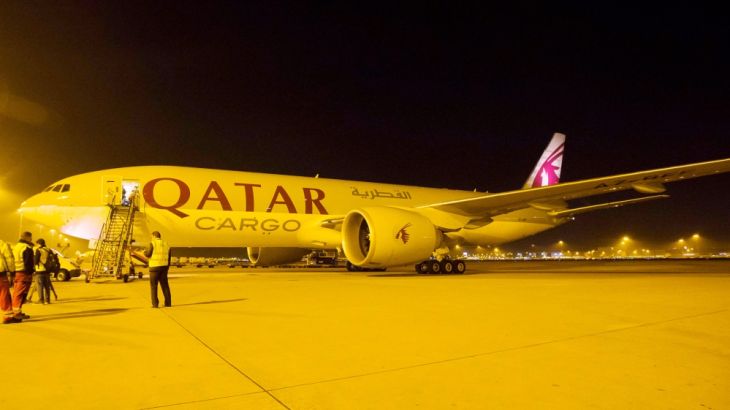Tougher screening for Middle East cargo flights to US
Flights originating from Saudi Arabia, UAE, Qatar, Jordan and Egypt will have to undergo extra screening.

Cargo flights from five Middle East countries will have to undergo extra security screening when flying to the United States, the US Transportation Security Administration (TSA) said on Monday.
Flights originating from Qatar, Jordan, Egypt, Saudi Arabia, and the United Arab Emirates will have to undergo extra screening.
Keep reading
list of 4 itemsMore than 11,000 evacuated in northern Indonesia as volcano erupts
Jordan, Lebanon, Iraq reopen airspace closed over Iran’s attacks on Israel
Australian women lose bid to sue Qatar Airways over 2020 strip searches
The measure was taken as part of an effort to raise global aviation security, according to TSA.
The programme uses US Department of Homeland Security “threat information and other data to employ a risk-based approach to improve air cargo security through targeted vetting”.
Growing concerns about bombs being sent in cargo aircraft were cited by the TSA as the reason of the new rules.
The new screenings will focus “on last points of departure locations where the threat is greatest”, the administration said.
The six points of departures and its corresponding airlines are:
- Hamad International Airport, Qatar Airways – Doha, Qatar
- Queen Alia International Airport, Royal Jordanian Airlines – Amman, Jordan
- King Abdul-Aziz International Airport, Saudi Airlines – Jeddah, Saudi Arabia
- King Khalid International Airport, Saudia Cargo – Riyadh, Saudi Arabia
- Dubai International Airport, Emirates – Dubai, United Arab Emirates
- Abu Dhabi International Airport, Etihad – Abu Dhabi, United Arab Emirates
- Cairo International Airport, Egypt Air – Cairo, Egypt
All cargo flights originating from these airports will have to adhere to the Air Cargo Advance Screening (ACAS) protocols, which state that carriers must submit data about the origins and sender of the cargo before it gets loaded onto a plane.
The ACAS protocols were already being voluntarily applied by airlines around the world, but the TSA said the new rules will make it mandatory for the flights originating from the seven airports to hand over the information to the US authorities.
A spokeswoman for Royal Jordanian Airlines told Reuters news agency it had “received this new amendment from TSA to be implemented on air cargo shipments, and we were given one month period to apply the new amendment”.
In March 2017, the US and UK implemented stricter rules for people flying to the United States from the Middle East and North Africa.
The ban required personal electronic devices larger than a mobile phone – such as tablets, laptops and cameras – be placed in checked baggage for US and Britain-bound flights.
In October, the US unveiled tough new security measures for international flights arriving in the country, including enhanced screening of devices, passengers, and explosive detection for the roughly 2,000 commercial flights landing daily in the United States from 280 airports in 105 countries.